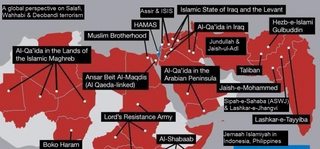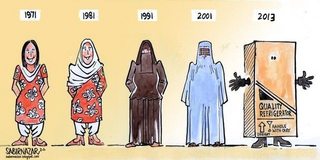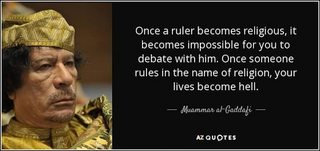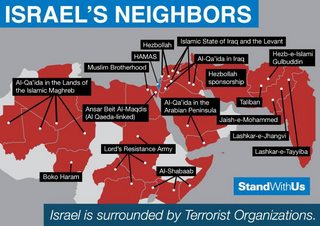Thread replies: 50
Thread images: 5
Thread images: 5
I
When are we going to tackle the true source of terrorism? 2017-06-01 09:26:59 Post No. 128044716
[Report] Image search: [Google]
When are we going to tackle the true source of terrorism? 2017-06-01 09:26:59 Post No. 128044716
[Report] Image search: [Google]
File: Global (1).jpg (153KB, 1024x478px) Image search:
[Google]

153KB, 1024x478px
When are we going to tackle the true source of terrorism?
I
2017-06-01 09:26:59
Post No. 128044716
[Report]
Namely the spread of Wahhabi educational institutions and militias around the world, backed by Saudi oil money. All terrorist groups who have committed terrorist attacks against the west, have Wahhabhism as their ideological base. Why aren't western governments investigating these extremist recruitment centres parading as legitimate educational institutions?
>>
>>128044716
Trump visited Saudi Arabia and Israel as his first presidential trips.
That says it all.
>>
>>128044716
By not overthrowing their ((dictators))?
>>
File: qdf1sys_d.jpg (46KB, 640x320px) Image search:
[Google]

46KB, 640x320px
Every muslim country that has had an influx of Gulf oil investments in Islamic education and mosques funding, experiences rapid Saudi style islamisation and Islamic conservatism. Most of Europe's mosques that are a hotbed of extremism have Saudi links.
>>
>>128044716
show up to the bildeburg protests this week
keep the fuckers scared of exposure
>>
>You Can’t Understand ISIS If You Don’t Know the History of Wahhabism in Saudi Arabia
BEIRUT — The dramatic arrival of Da’ish (ISIS) on the stage of Iraq has shocked many in the West. Many have been perplexed — and horrified — by its violence and its evident magnetism for Sunni youth. But more than this, they find Saudi Arabia’s ambivalence in the face of this manifestation both troubling and inexplicable, wondering, “Don’t the Saudis understand that ISIS threatens them, too?”
It appears — even now — that Saudi Arabia’s ruling elite is divided. Some applaud that ISIS is fighting Iranian Shiite “fire” with Sunni “fire”; that a new Sunni state is taking shape at the very heart of what they regard as a historical Sunni patrimony; and they are drawn by Da’ish’s strict Salafist ideology.
Other Saudis are more fearful, and recall the history of the revolt against Abd-al Aziz by the Wahhabist Ikhwan (Disclaimer: this Ikhwan has nothing to do with the Muslim Brotherhood Ikhwan — please note, all further references hereafter are to the Wahhabist Ikhwan, and not to the Muslim Brotherhood Ikhwan), but which nearly imploded Wahhabism and the al-Saud in the late 1920s.
Many Saudis are deeply disturbed by the radical doctrines of Da’ish (ISIS) — and are beginning to question some aspects of Saudi Arabia’s direction and discourse.
THE SAUDI DUALITY
Saudi Arabia’s internal discord and tensions over ISIS can only be understood by grasping the inherent (and persisting) duality that lies at the core of the Kingdom’s doctrinal makeup and its historical origins.
>>
>>128048460
One dominant strand to the Saudi identity pertains directly to Muhammad ibn ʿAbd al-Wahhab (the founder of Wahhabism), and the use to which his radical, exclusionist puritanism was put by Ibn Saud. (The latter was then no more than a minor leader — amongst many — of continually sparring and raiding Bedouin tribes in the baking and desperately poor deserts of the Nejd.)
The second strand to this perplexing duality, relates precisely to King Abd-al Aziz’s subsequent shift towards statehood in the 1920s: his curbing of Ikhwani violence (in order to have diplomatic standing as a nation-state with Britain and America); his institutionalization of the original Wahhabist impulse — and the subsequent seizing of the opportunely surging petrodollar spigot in the 1970s, to channel the volatile Ikhwani current away from home towards export — by diffusing a cultural revolution, rather than violent revolution throughout the Muslim world.
But this “cultural revolution” was no docile reformism. It was a revolution based on Abd al-Wahhab’s Jacobin-like hatred for the putrescence and deviationism that he perceived all about him — hence his call to purge Islam of all its heresies and idolatries.
>>
>>128048678
MUSLIM IMPOSTORS
The American author and journalist, Steven Coll, has written how this austere and censorious disciple of the 14th century scholar Ibn Taymiyyah, Abd al-Wahhab, despised “the decorous, arty, tobacco smoking, hashish imbibing, drum pounding Egyptian and Ottoman nobility who travelled across Arabia to pray at Mecca.”
In Abd al-Wahhab’s view, these were not Muslims; they were imposters masquerading as Muslims. Nor, indeed, did he find the behavior of local Bedouin Arabs much better. They aggravated Abd al-Wahhab by their honoring of saints, by their erecting of tombstones, and their “superstition” (e.g. revering graves or places that were deemed particularly imbued with the divine).
All this behavior, Abd al-Wahhab denounced as bida — forbidden by God.
Like Taymiyyah before him, Abd al-Wahhab believed that the period of the Prophet Muhammad’s stay in Medina was the ideal of Muslim society (the “best of times”), to which all Muslims should aspire to emulate (this, essentially, is Salafism).
Taymiyyah had declared war on Shi’ism, Sufism and Greek philosophy. He spoke out, too against visiting the grave of the prophet and the celebration of his birthday, declaring that all such behavior represented mere imitation of the Christian worship of Jesus as God (i.e. idolatry). Abd al-Wahhab assimilated all this earlier teaching, stating that “any doubt or hesitation” on the part of a believer in respect to his or her acknowledging this particular interpretation of Islam should “deprive a man of immunity of his property and his life.”
>>
>>128048893
One of the main tenets of Abd al-Wahhab’s doctrine has become the key idea of takfir. Under the takfiri doctrine, Abd al-Wahhab and his followers could deem fellow Muslims infidels should they engage in activities that in any way could be said to encroach on the sovereignty of the absolute Authority (that is, the King). Abd al-Wahhab denounced all Muslims who honored the dead, saints, or angels. He held that such sentiments detracted from the complete subservience one must feel towards God, and only God. Wahhabi Islam thus bans any prayer to saints and dead loved ones, pilgrimages to tombs and special mosques, religious festivals celebrating saints, the honoring of the Muslim Prophet Muhammad’s birthday, and even prohibits the use of gravestones when burying the dead.
Abd al-Wahhab demanded conformity — a conformity that was to be demonstrated in physical and tangible ways. He argued that all Muslims must individually pledge their allegiance to a single Muslim leader (a Caliph, if there were one). Those who would not conform to this view should be killed, their wives and daughters violated, and their possessions confiscated, he wrote. The list of apostates meriting death included the Shiite, Sufis and other Muslim denominations, whom Abd al-Wahhab did not consider to be Muslim at all.
There is nothing here that separates Wahhabism from ISIS. The rift would emerge only later: from the subsequent institutionalization of Muhammad ibn ʿAbd al-Wahhab’s doctrine of “One Ruler, One Authority, One Mosque” — these three pillars being taken respectively to refer to the Saudi king, the absolute authority of official Wahhabism, and its control of “the word” (i.e. the mosque).
>>
>>128049149
It is this rift — the ISIS denial of these three pillars on which the whole of Sunni authority presently rests — makes ISIS, which in all other respects conforms to Wahhabism, a deep threat to Saudi Arabia.
BRIEF HISTORY 1741- 1818
Abd al-Wahhab’s advocacy of these ultra radical views inevitably led to his expulsion from his own town — and in 1741, after some wanderings, he found refuge under the protection of Ibn Saud and his tribe. What Ibn Saud perceived in Abd al-Wahhab’s novel teaching was the means to overturn Arab tradition and convention. It was a path to seizing power.
>>
Ibn Saud’s clan, seizing on Abd al-Wahhab’s doctrine, now could do what they always did, which was raiding neighboring villages and robbing them of their possessions. Only now they were doing it not within the ambit of Arab tradition, but rather under the banner of jihad. Ibn Saud and Abd al-Wahhab also reintroduced the idea of martyrdom in the name of jihad, as it granted those martyred immediate entry into paradise.
In the beginning, they conquered a few local communities and imposed their rule over them. (The conquered inhabitants were given a limited choice: conversion to Wahhabism or death.) By 1790, the Alliance controlled most of the Arabian Peninsula and repeatedly raided Medina, Syria and Iraq.
Their strategy — like that of ISIS today — was to bring the peoples whom they conquered into submission. They aimed to instill fear. In 1801, the Allies attacked the Holy City of Karbala in Iraq. They massacred thousands of Shiites, including women and children. Many Shiite shrines were destroyed, including the shrine of Imam Hussein, the murdered grandson of Prophet Muhammad.
>>
A British official, Lieutenant Francis Warden, observing the situation at the time, wrote: “They pillaged the whole of it [Karbala], and plundered the Tomb of Hussein... slaying in the course of the day, with circumstances of peculiar cruelty, above five thousand of the inhabitants ...”
Osman Ibn Bishr Najdi, the historian of the first Saudi state, wrote that Ibn Saud committed a massacre in Karbala in 1801. He proudly documented that massacre saying, “we took Karbala and slaughtered and took its people (as slaves), then praise be to Allah, Lord of the Worlds, and we do not apologize for that and say: ‘And to the unbelievers: the same treatment.’”
In 1803, Abdul Aziz then entered the Holy City of Mecca, which surrendered under the impact of terror and panic (the same fate was to befall Medina, too). Abd al-Wahhab’s followers demolished historical monuments and all the tombs and shrines in their midst. By the end, they had destroyed centuries of Islamic architecture near the Grand Mosque.
>>
But in November of 1803, a Shiite assassin killed King Abdul Aziz (taking revenge for the massacre at Karbala). His son, Saud bin Abd al Aziz, succeeded him and continued the conquest of Arabia. Ottoman rulers, however, could no longer just sit back and watch as their empire was devoured piece by piece. In 1812, the Ottoman army, composed of Egyptians, pushed the Alliance out from Medina, Jeddah and Mecca. In 1814, Saud bin Abd al Aziz died of fever. His unfortunate son Abdullah bin Saud, however, was taken by the Ottomans to Istanbul, where he was gruesomely executed (a visitor to Istanbul reported seeing him having been humiliated in the streets of Istanbul for three days, then hanged and beheaded, his severed head fired from a canon, and his heart cut out and impaled on his body).
In 1815, Wahhabi forces were crushed by the Egyptians (acting on the Ottoman’s behalf) in a decisive battle. In 1818, the Ottomans captured and destroyed the Wahhabi capital of Dariyah. The first Saudi state was no more. The few remaining Wahhabis withdrew into the desert to regroup, and there they remained, quiescent for most of the 19th century.
>>
HISTORY RETURNS WITH ISIS
It is not hard to understand how the founding of the Islamic State by ISIS in contemporary Iraq might resonate amongst those who recall this history. Indeed, the ethos of 18th century Wahhabism did not just wither in Nejd, but it roared back into life when the Ottoman Empire collapsed amongst the chaos of World War I.
The Al Saud — in this 20th century renaissance — were led by the laconic and politically astute Abd-al Aziz, who, on uniting the fractious Bedouin tribes, launched the Saudi “Ikhwan” in the spirit of Abd-al Wahhab’s and Ibn Saud’s earlier fighting proselytisers.
The Ikhwan was a reincarnation of the early, fierce, semi-independent vanguard movement of committed armed Wahhabist “moralists” who almost had succeeded in seizing Arabia by the early 1800s. In the same manner as earlier, the Ikhwan again succeeded in capturing Mecca, Medina and Jeddah between 1914 and 1926. Abd-al Aziz, however, began to feel his wider interests to be threatened by the revolutionary “Jacobinism” exhibited by the Ikhwan. The Ikhwan revolted — leading to a civil war that lasted until the 1930s, when the King had them put down: he machine-gunned them.
For this king, (Abd-al Aziz), the simple verities of previous decades were eroding. Oil was being discovered in the peninsular. Britain and America were courting Abd-al Aziz, but still were inclined to support Sharif Husain as the only legitimate ruler of Arabia. The Saudis needed to develop a more sophisticated diplomatic posture.
>>
>>128050079
So Wahhabism was forcefully changed from a movement of revolutionary jihad and theological takfiri purification, to a movement of conservative social, political, theological, and religious da’wa (Islamic call) and to justifying the institution that upholds loyalty to the royal Saudi family and the King’s absolute power.
>>
>>128050221
>OIL WEALTH SPREAD WAHHABISM
With the advent of the oil bonanza — as the French scholar, Giles Kepel writes, Saudi goals were to “reach out and spread Wahhabism across the Muslim world ... to “Wahhabise” Islam, thereby reducing the “multitude of voices within the religion” to a “single creed” — a movement which would transcend national divisions. Billions of dollars were — and continue to be — invested in this manifestation of soft power.
It was this heady mix of billion dollar soft power projection — and the Saudi willingness to manage Sunni Islam both to further America’s interests, as it concomitantly embedded Wahhabism educationally, socially and culturally throughout the lands of Islam — that brought into being a western policy dependency on Saudi Arabia, a dependency that has endured since Abd-al Aziz’s meeting with Roosevelt on a U.S. warship (returning the president from the Yalta Conference) until today.
Westerners looked at the Kingdom and their gaze was taken by the wealth; by the apparent modernization; by the professed leadership of the Islamic world. They chose to presume that the Kingdom was bending to the imperatives of modern life — and that the management of Sunni Islam would bend the Kingdom, too, to modern life.
>>
>>128050339
But the Saudi Ikhwan approach to Islam did not die in the 1930s. It retreated, but it maintained its hold over parts of the system — hence the duality that we observe today in the Saudi attitude towards ISIS.
On the one hand, ISIS is deeply Wahhabist. On the other hand, it is ultra radical in a different way. It could be seen essentially as a corrective movement to contemporary Wahhabism.
ISIS is a “post-Medina” movement: it looks to the actions of the first two Caliphs, rather than the Prophet Muhammad himself, as a source of emulation, and it forcefully denies the Saudis’ claim of authority to rule.
As the Saudi monarchy blossomed in the oil age into an ever more inflated institution, the appeal of the Ikhwan message gained ground (despite King Faisal’s modernization campaign). The “Ikhwan approach” enjoyed — and still enjoys — the support of many prominent men and women and sheikhs. In a sense, Osama bin Laden was precisely the representative of a late flowering of this Ikhwani approach.
>>
>>128050460
Today, ISIS’ undermining of the legitimacy of the King’s legitimacy is not seen to be problematic, but rather a return to the true origins of the Saudi-Wahhab project.
In the collaborative management of the region by the Saudis and the West in pursuit of the many western projects (countering socialism, Ba’athism, Nasserism, Soviet and Iranian influence), western politicians have highlighted their chosen reading of Saudi Arabia (wealth, modernization and influence), but they chose to ignore the Wahhabist impulse.
After all, the more radical Islamist movements were perceived by Western intelligence services as being more effective in toppling the USSR in Afghanistan — and in combatting out-of-favor Middle Eastern leaders and states.
Why should we be surprised then, that from Prince Bandar’s Saudi-Western mandate to manage the insurgency in Syria against President Assad should have emerged a neo-Ikhwan type of violent, fear-inducing vanguard movement: ISIS? And why should we be surprised — knowing a little about Wahhabism — that “moderate” insurgents in Syria would become rarer than a mythical unicorn? Why should we have imagined that radical Wahhabism would create moderates? Or why could we imagine that a doctrine of “One leader, One authority, One mosque: submit to it, or be killed” could ever ultimately lead to moderation or tolerance?
>>
Pol really isn't a place to discuss serious issues and have rational debates ever since the new alt faggots came last year.
>>
>>128049825
What does the average Saudi think of this? They must realise their country had a significant role in the propagation of extremism.
>>
>>128051959
Well what I can tell you is that 75%+ of Saudis don't even know what you posted.
>>
>>128051959
Anon can you screencap this i am on phone and i will realy need this
>>
I believe Lord's army is a Pagan (Shamanist)-Chrstian hybrid.
>>
>>128052741
Why do Burgers try their best to seem genuinely retarded?
>>
>>128052321
So Saudis are the Burgers of the middle east? Most don't even know what their government is doing in all these countries, and only care about getting neetbux.
>>
>>128053076
I presume that's propaganda then.
>>
>>128053907
Pretty much. Saudi education doesn't cover touchy subjects, so you can make that a meme like burger education.
Having said that, your post omitted an important turning point in the history of Wahhabism in Saudi Arabia, namely the siege of Mecca (along with the Iranian revolution).
>>
iirc Muhammad ibn ʿAbd al-Wahhab actually talked his ideas with many muslim households and he was kicked out by all of them except Al-Saud. Or this misinfo?
>>
>>128055440
For whatever it's worth he was disowned by his own family.
>>
File: images.jpg (24KB, 559x263px) Image search:
[Google]

24KB, 559x263px
So the only way to keep the wahabists from gaining power would be through dictatorship or fashism
Democrecy have proven to be the death of us since the saudis control most of the imams who promote this ideologie and since they brainwash the masses through mosqes so that everyone would vote for the wahabists
This is why most arab presidents cease control over their goverments once they see that the radicals are gaining influence on the masses
But alas most of these ""dictators"" end up dead once america and saudis fund these ""freedom fighters"" and then the whole country becomes a wastland where terrorists fight other terrorists
The scary thing is that it will happen to every arabian country and if we resist we will end up like libya or syria
>>
>>128054471
Why were the Saudi elite so fearful of militant Shiaism? Most of the Islamic world are Sunni and Shias don't really have much power in the Arab world, other than small pockets of power in Lebanon and shia dominant Syria(before the fall of Sadam), and they could always call on the support of their sunni ally if Shias ever tried to invade shia parts of Saudi Arabia. The Saudis have planted the seeds of their own destruction.
>>
>>128056780
They're afraid of the concept of religious revolution to begin with. That's why I said the siege of Mecca is critical to understanding Saudi Arabia.
Also the Shia areas are the oil areas, including production and processing facilities. Enough said.
>>
File: Israels neighbours.jpg (85KB, 700x495px) Image search:
[Google]

85KB, 700x495px
>>128044716
Kek, you fucking jew why you changed the map
>>
>>128056780
Because shias control hezbollah a big problem to israel and american troopes if they get their hands on oil they will get better armed
You see the saudi need america and so it needs its greatest ally israel as the main funders to wahabism
This is why ISIS attacks assad forces and iran and why israel and america both helps in bombing them but the wahabist groups ((ISIS)) never attacks israel
You see there is everything to gain from this aliance
>saudi get to keep oil and control the arab countries through wahabism and by installing their imams
>usa also get oil and protects their ally
>israel get to destroy there enemies
>>
>>128057277
Most of Saudis problem wouldnt exist if they treated their Shia minority better. They could have spent the 40 billion plus they currently use to propagate their militant wahabhism around the world to generate jobs in Shia parts Saudi Arabia, and they wouldn't feel threatened from a possible Shia takeover and ISIS would exist for that matter. This is another example of Arab leaders stupidity
>>
>>128057718
Go back to Algeria, Omar
>>
>>128058846
I don't disagree. Same thing applies to Bahrain and the rest of gulf countries except Oman of course.
>>
>>128059490
are you mad that your MS paint edit is shit, ping ping ?
>>
>>128059490
ow wait, you're not OP
fuck off cunt
>>
>>128044716
If anyone wants to have the text in a link to save/share
http://www.huffingtonpost.com/alastair-crooke/isis-wahhabism-saudi-arabia_b_5717157.html
>>
>>128060486
Always archive.
>http://huffingtonpost com/alastair-crooke/isis-wahhabism-saudi-arabia_b_5717157.html
--> https://archive.is/h5gYB
>>
File: predator_kony_2012.jpg (53KB, 600x341px) Image search:
[Google]

53KB, 600x341px
>>128057718
>Lord's Resistance Army
>Wahhabism/Salafism/Deobandi
>>
>>128059535
Are there any concerted efforts by Sunnis to support persecuted Shia minorities and end sectarianism?
>>
>>128061845
No, if anything it's getting worse in countries that previously treated their Shia citizens relatively well (e.g. UAE).
>>
>>128062147
What' has happened Shias in the UAE?
>>
>>128063908
They're not allowed to hold important positions for starters. There are no sources that I can quote so pointless to just list things that can't be proven. I heard first hand accounts of Shia emiratis being asked to resign simply because they're Shia (the fact that they held the positions in the first place tell you it's getting worse now).
>>
>>128059782
>>128059851
How does it feel,being the most hated group in France? North Africans
>>
>>128044716
>>128044716
Because my young kiwi, the CIA funds ISIS
>>
>>128065411
Why don't sunnis have sympathy for Shiites?
>>
>>128052741
it is. check out their beliefs. similar to voodoo with melding religions
Thread posts: 50
Thread images: 5
Thread images: 5